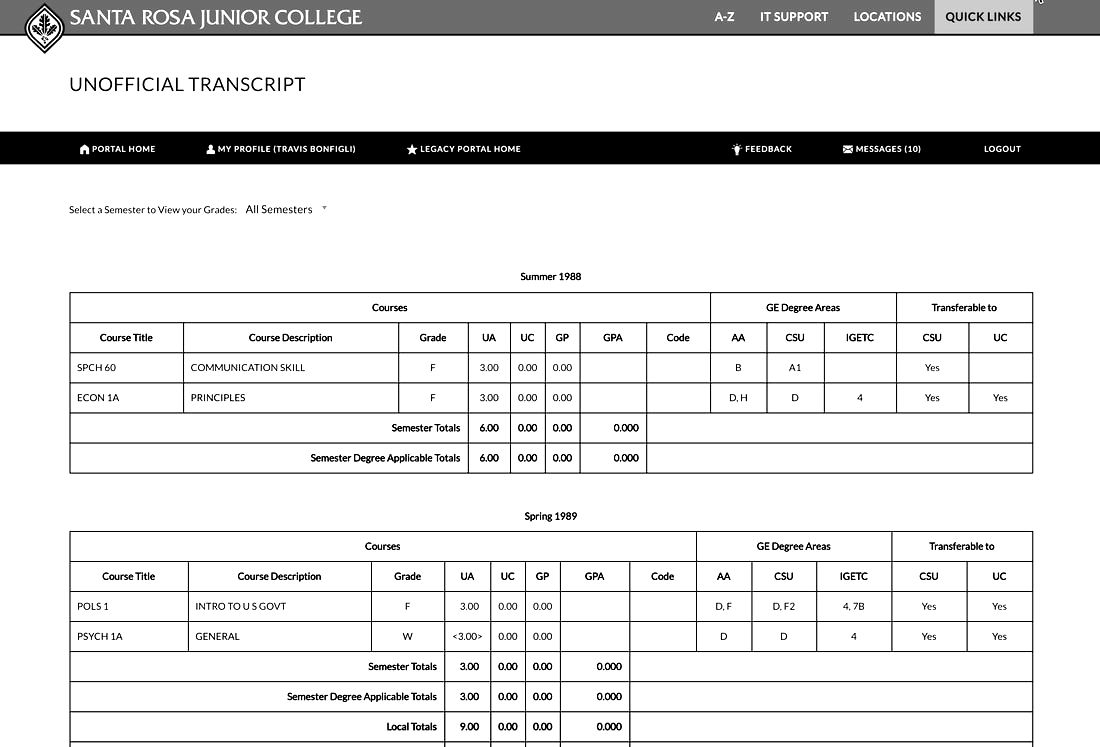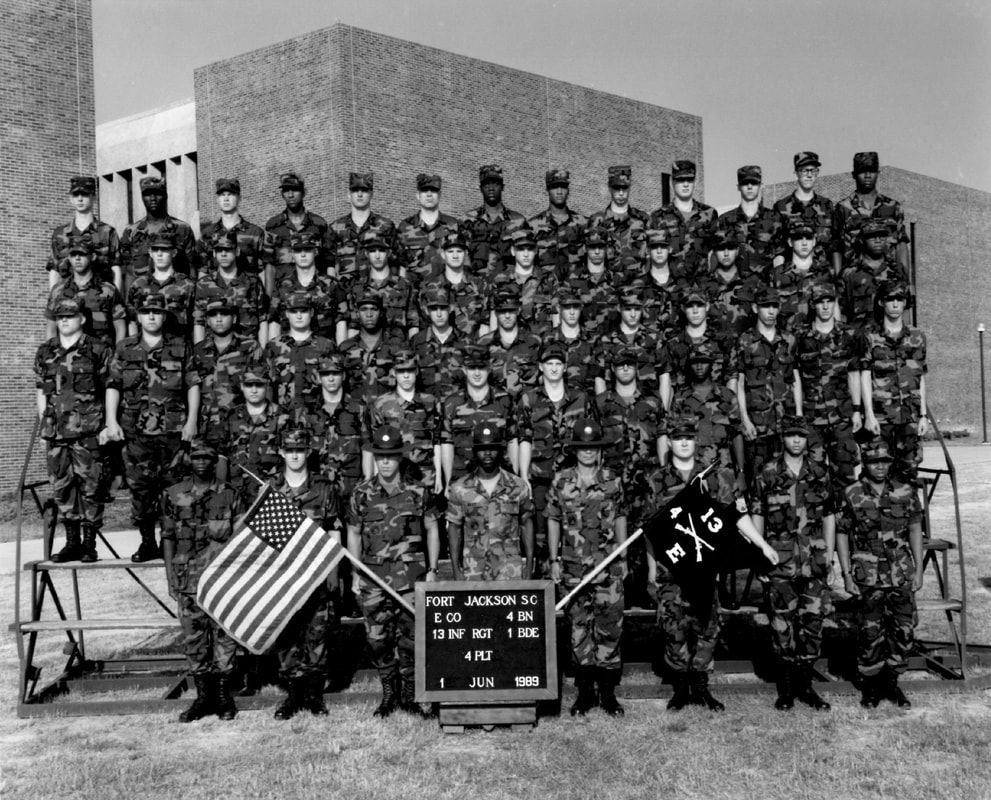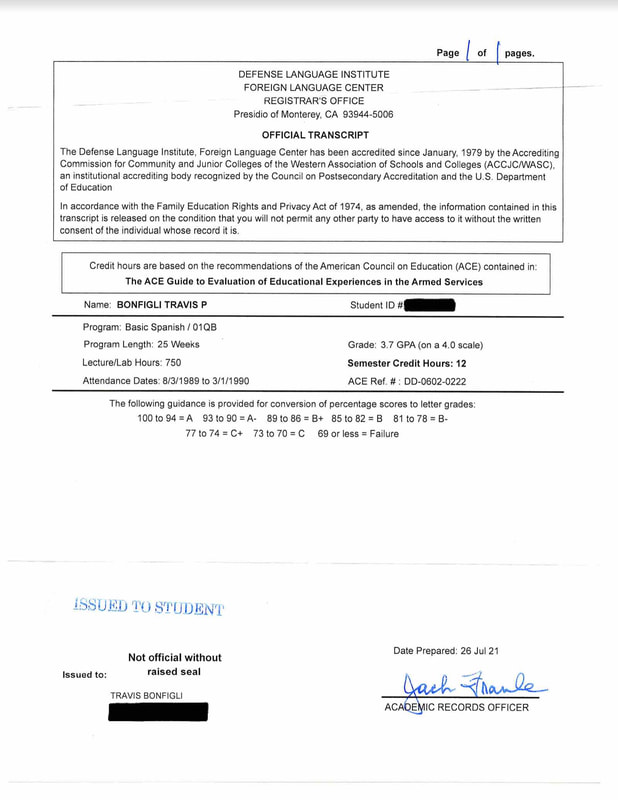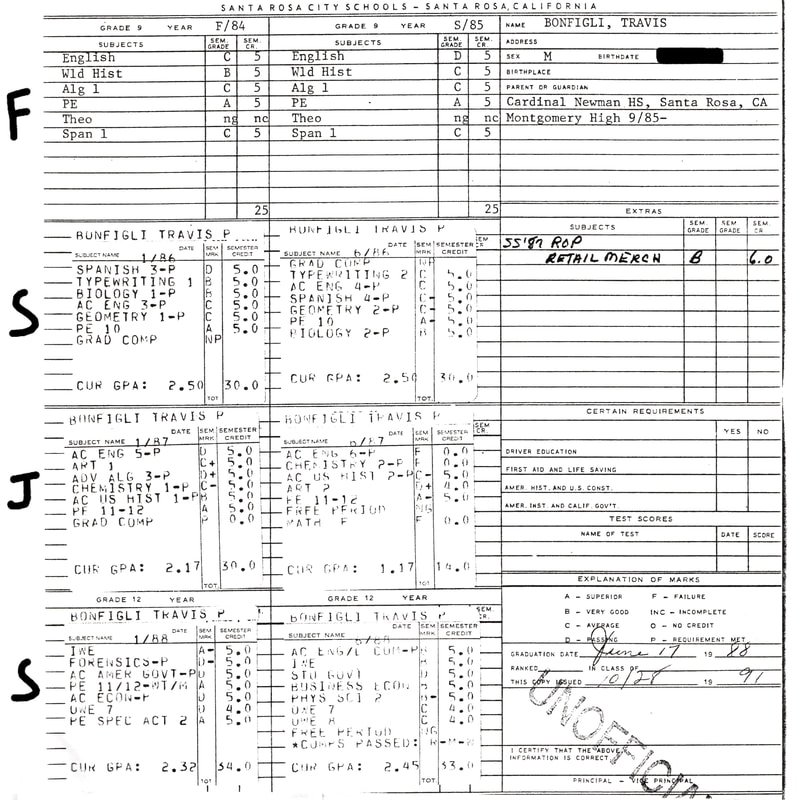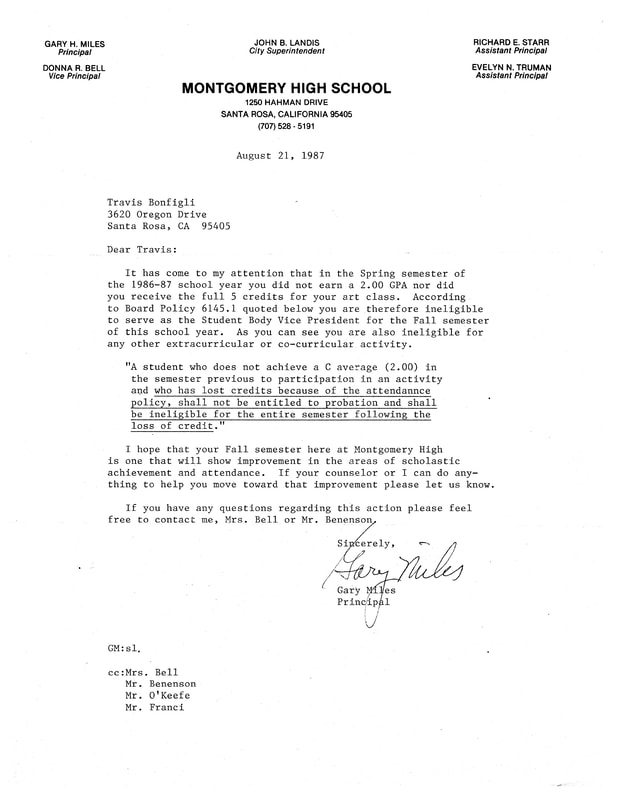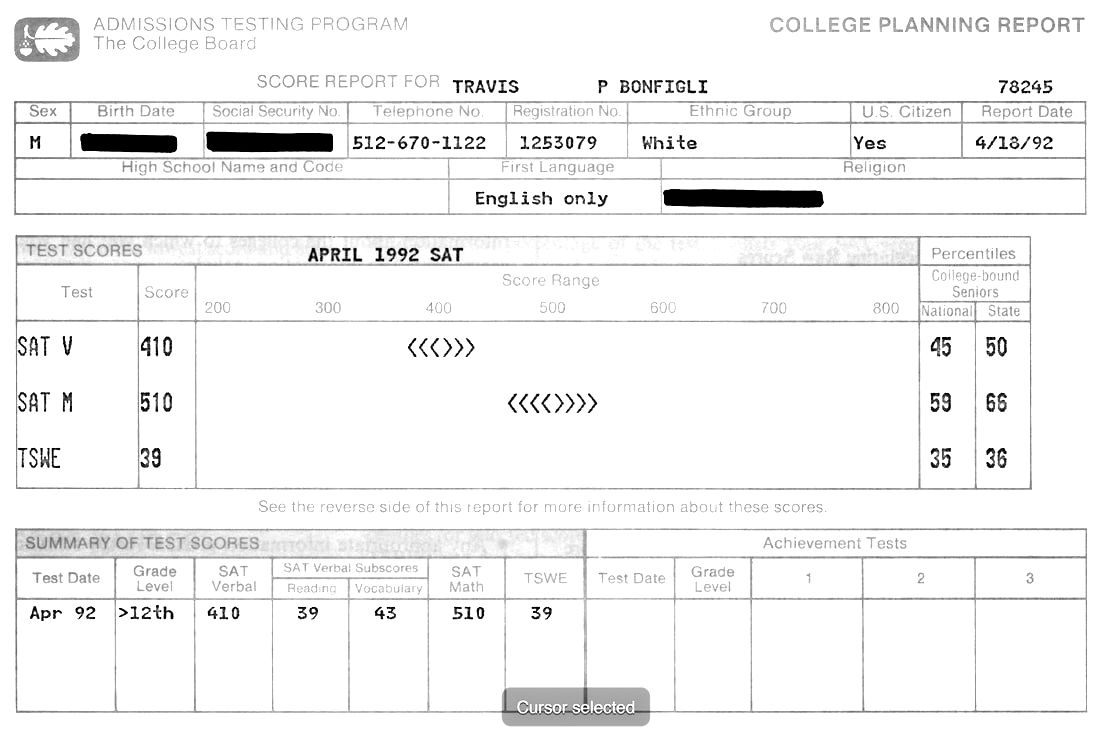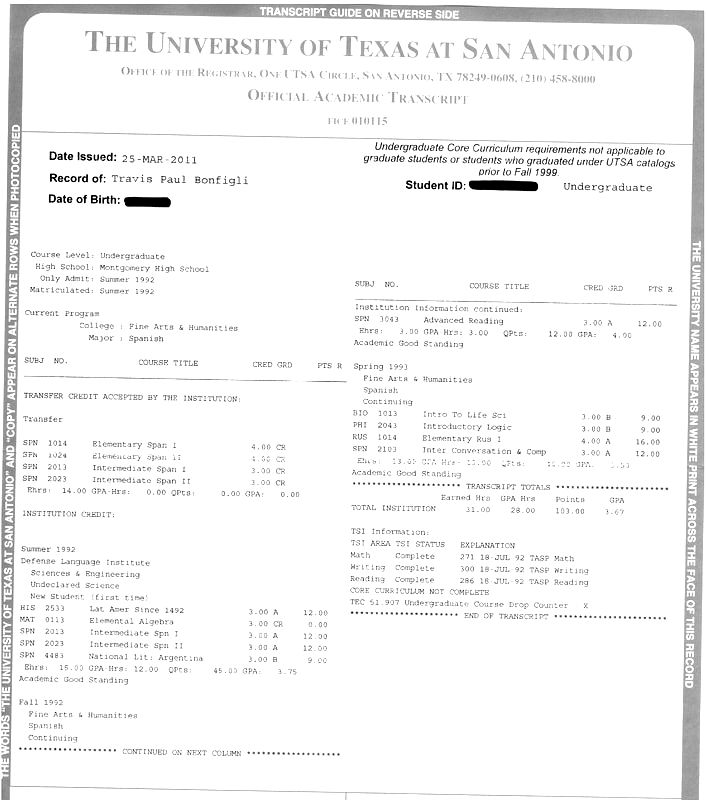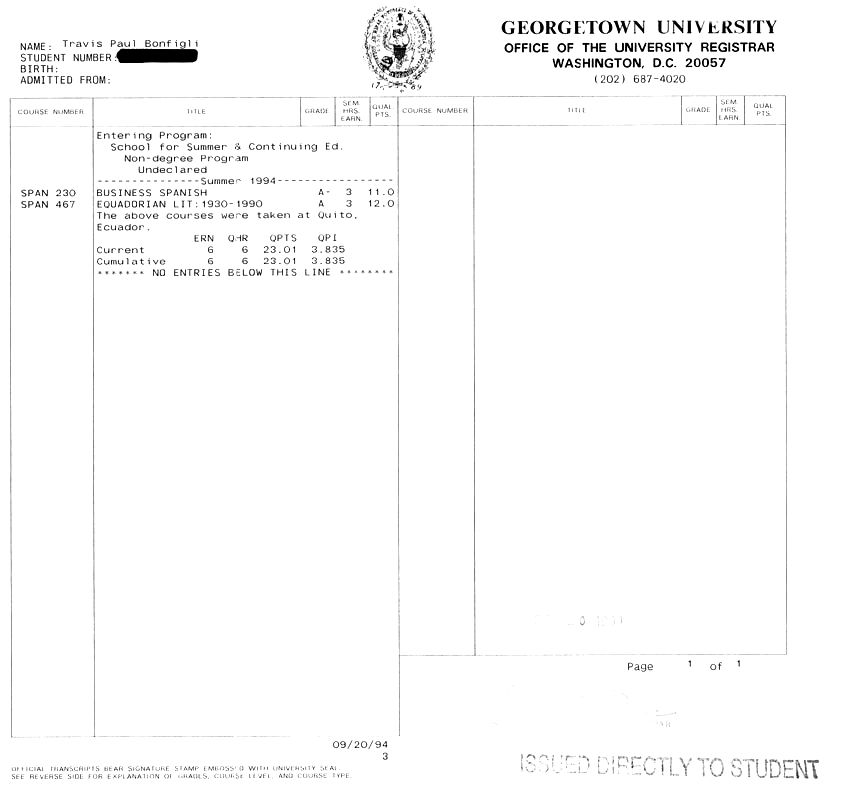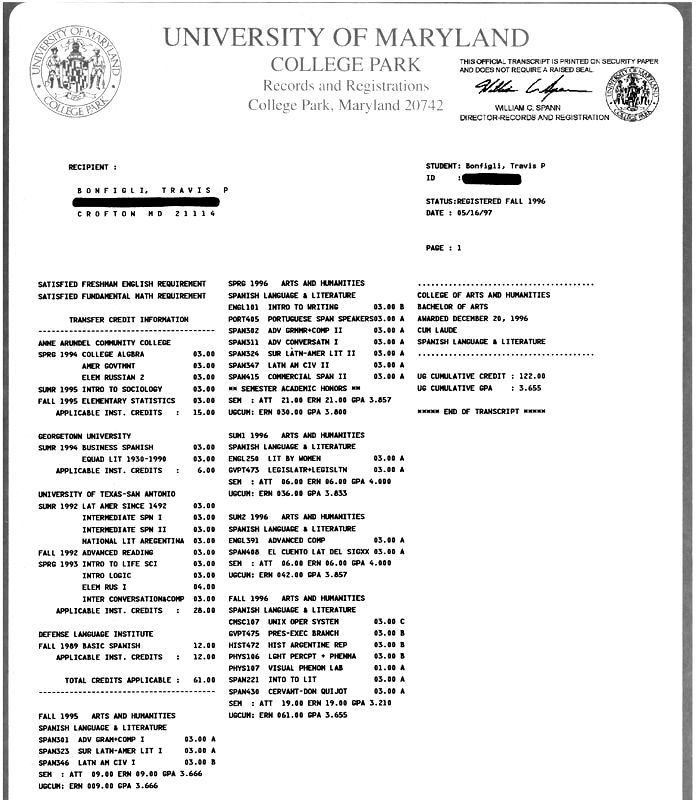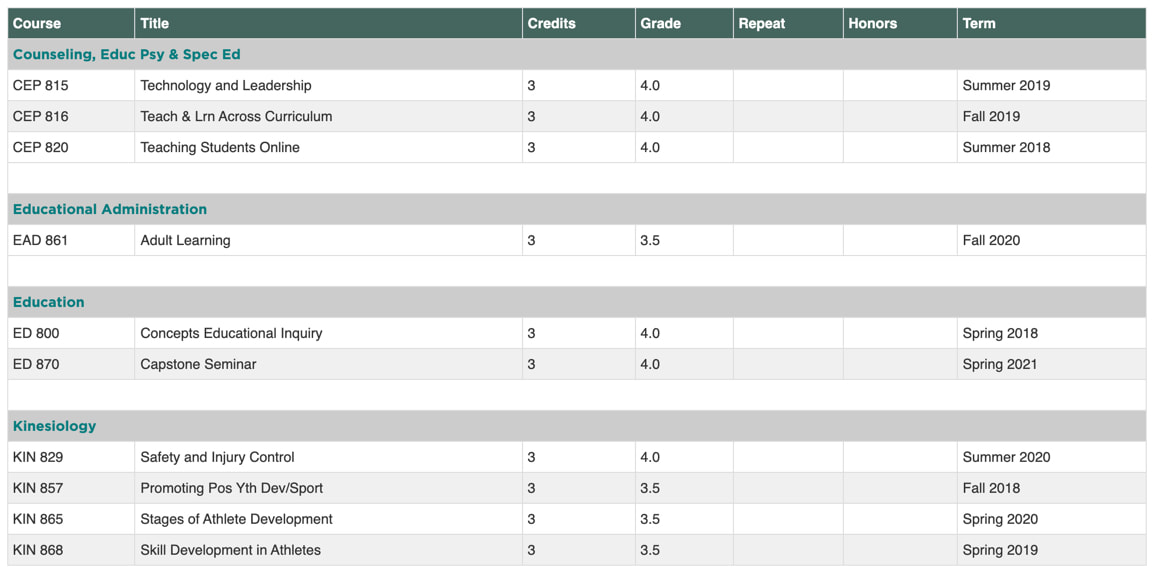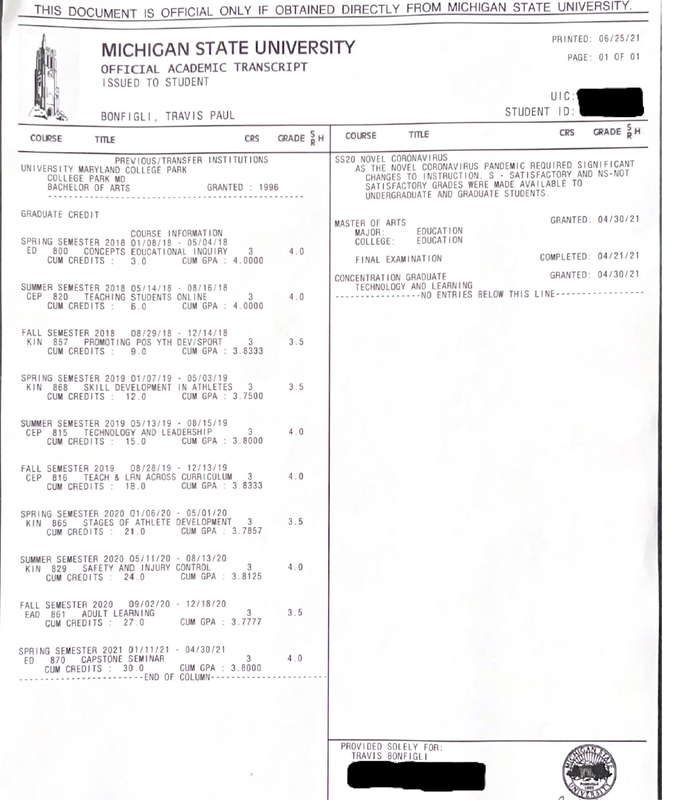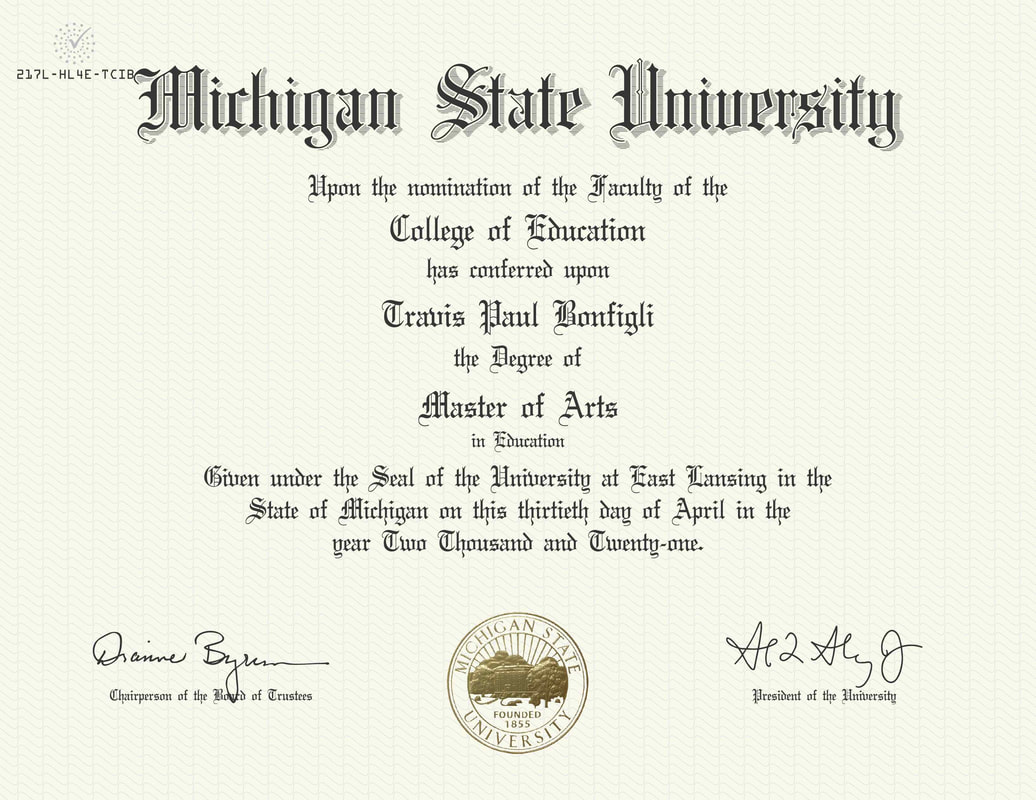My Journey
"All report cards should come with the disclaimer that past performance is not always indicative of future results."
- Travis P. Bonfigli
"All report cards should come with the disclaimer that past performance is not always indicative of future results."
- Travis P. Bonfigli
One of my earliest memories of learning goes all the way back to Village Elementary School on Yulupa Avenue in Santa Rosa, California. It would have been right around the summer of 1974 when my parents brought me in to test for kindergarten. The "test", as it turned out, was nothing more than reaching into a felt bag and identifying - without looking - each item one at a time before I pulled it out of the bag. It wasn't until I got to the last item, and I still remember this like it was yesterday, that I tried to peek into the bag to see what the final item was because I had no idea. It turned out to be a nail. The key to this little story is not the fact that back in 1974 they would put a nail into a felt bag and have 5-year-olds reach into said bag, it was that I actually tried to look into the bag (read: to cheat!) to see what the object was that I could not identify. Too concerned about the results instead of embracing the learning aspect of the event, but then again, I was only five at the time. It certainly left an impression on me that, as I sit here today some 45 years later, I can still see myself sitting in that chair in the kindergarten room at Village Elementary School and reaching into that bag so desperate to identify all the items so my parents would be proud.
My time at Village Elementary School was short and I ended up switching elementary schools after 3rd grade but not because we moved, but because I wanted to go to the same school as my best friend, Stu. It was on to Spring Creek Elementary School on Mayette Avenue in Santa Rosa, California! The 4th grade was one of the best experiences of my life and this was in large part due to the teacher, Mrs. Castleberry. Even now, looking back at all the different teachers I had on my educational journey, she stands out as one of the very best. She listened, she cared, she let you be you. Unfortunately for me, my 5th grade experience with Mrs. Berg was not so much fun. I'm not sure what happened between the 4th and 5th grade, but my 5th grade year was an unmitigated academic and behavioral disaster and 6th grade was not much better. I quickly became the kid that you did not want in your classroom. I was constantly in trouble, underperforming, disengaged, and more interested in disrupting everything and everyone than in learning. Unfortunately, this was a trend that continued throughout junior high and into high school.
Reflecting back I still have this sense of shame and regret that I carry for all of the time and educational opportunity that was wasted in my youth. Fortunately for me, the realization of the importance of an education would all change in the space of about 30 seconds after I arrived at Fort Jackson, South Carolina on a very hot and humid night back in May of 1989 for Army basic training. What led me to joining the Army was a disaster of a summer semester at the Santa Rosa Junior College (SRJC) in Santa Rosa, California in 1988, followed by a failed attempt to make it on my own as a teller at bank in Coronado, California, and then another botched attempt at the SRJC and I have the transcript to prove it:
My time at Village Elementary School was short and I ended up switching elementary schools after 3rd grade but not because we moved, but because I wanted to go to the same school as my best friend, Stu. It was on to Spring Creek Elementary School on Mayette Avenue in Santa Rosa, California! The 4th grade was one of the best experiences of my life and this was in large part due to the teacher, Mrs. Castleberry. Even now, looking back at all the different teachers I had on my educational journey, she stands out as one of the very best. She listened, she cared, she let you be you. Unfortunately for me, my 5th grade experience with Mrs. Berg was not so much fun. I'm not sure what happened between the 4th and 5th grade, but my 5th grade year was an unmitigated academic and behavioral disaster and 6th grade was not much better. I quickly became the kid that you did not want in your classroom. I was constantly in trouble, underperforming, disengaged, and more interested in disrupting everything and everyone than in learning. Unfortunately, this was a trend that continued throughout junior high and into high school.
Reflecting back I still have this sense of shame and regret that I carry for all of the time and educational opportunity that was wasted in my youth. Fortunately for me, the realization of the importance of an education would all change in the space of about 30 seconds after I arrived at Fort Jackson, South Carolina on a very hot and humid night back in May of 1989 for Army basic training. What led me to joining the Army was a disaster of a summer semester at the Santa Rosa Junior College (SRJC) in Santa Rosa, California in 1988, followed by a failed attempt to make it on my own as a teller at bank in Coronado, California, and then another botched attempt at the SRJC and I have the transcript to prove it:
I was actually doing pretty good at the SRJC during the summer right after high school (in the Speech class anyway) back in 1988, but then with a week to go in the semester I decided to just take off and move to Coronado, California in July. I came back to Santa Rosa and figured I would try again and that was another mistake and a sign that I still wasn't ready and didn't have my priorities straight. Later that summer Army basic training would serve as a harsh reality check and wake up call that I so desperately needed at that time in my life and it would be served up in a brutal fashion. Hindsight being 20/20, it was exactly what I needed and while at the time I didn't see it as a good move, it was the best decision I ever made.
I had really never appreciated the opportunities that had been presented to me, both personally and educationally, until that moment I stepped off the bus in front of an Army barracks building on Fort Jackson that night in May of 1989. There was no where I wanted to be more than back in an air-conditioned classroom listening to Señora Turner go over how to conjugate the verb 'Tener' in Spanish class and practicing our singing of 'De Colores'. Again, a year after graduating high school, and in large part because I had no other options, I enlisted in the Army as a 98G Spanish Linguist (that is the job descriptor or the Military Occupational Speciality (MOS) as they call it) with a very good friend (and we are even better friends today than we were back then). The irony of me joining the Army to become a Spanish Linguist was that I had done terrible in Spanish in high school (as you will see below - was even thrown out of my freshman class at one point - and still feel like I will never be able to apologize enough to Mr. Frank Guillen who was my teacher) and didn't actually pass the military's linguist exam (called the DLAB) to qualify for the job! True story. Here is what happened on the day I took the DLAB exam. You needed an 89 on the exam to get into the Defense Language Institute (DLI) located in Monterey, California and I scored an 87. Not sure what to do, I showed some hesitation about joining at all. This was when the recruiter told me that if I would take the 'airborne' option that he could get me into the language school. When I said, 'Yes.', he literally changed the '7' (in my score of 87) to a '9'. Remember, this was before computers back when pencils and paper ruled the day! Again, true story and, as they say, the rest is history!
I met a very diverse group of young men over the next nine weeks of basic training - some who had dropped out of school at the age of 14 (you didn't need a high school diploma to join the Army back then - especially if you were going to be in the infantry, or as their MOS identified them: 11B - the 'B' stands for Bravo), some who could barely write their own names, others who could barely read - and that scared me. It scared me a lot. I don't mean to imply that these other soldiers physically scared me, no, it was a much deeper and more visceral fear (and realization) that this was the path I had been aimlessly stumbling along for years and didn't even realize it. What's even more sad is that had you told me back then that this was the path I was on, I probably wouldn't have believed you or wouldn't have paid attention. I wasn't ready for the message. It actually took seeing what it looks like when someone can't read or write or do basic addition and subtraction to wake me up to the idea that an education is invaluable in life. This was one of those transformational life moments that changed my trajectory and outlook on learning forever. I now like to refer to these as "Mezirow Moments", for Jack Mezirow, the father of transformative learning theory. I was more than ready for the message after this experience.
Here I am (top row and fifth from the left) on 1 June 1989 with that group of young men all trying to find our way in the world:
I had really never appreciated the opportunities that had been presented to me, both personally and educationally, until that moment I stepped off the bus in front of an Army barracks building on Fort Jackson that night in May of 1989. There was no where I wanted to be more than back in an air-conditioned classroom listening to Señora Turner go over how to conjugate the verb 'Tener' in Spanish class and practicing our singing of 'De Colores'. Again, a year after graduating high school, and in large part because I had no other options, I enlisted in the Army as a 98G Spanish Linguist (that is the job descriptor or the Military Occupational Speciality (MOS) as they call it) with a very good friend (and we are even better friends today than we were back then). The irony of me joining the Army to become a Spanish Linguist was that I had done terrible in Spanish in high school (as you will see below - was even thrown out of my freshman class at one point - and still feel like I will never be able to apologize enough to Mr. Frank Guillen who was my teacher) and didn't actually pass the military's linguist exam (called the DLAB) to qualify for the job! True story. Here is what happened on the day I took the DLAB exam. You needed an 89 on the exam to get into the Defense Language Institute (DLI) located in Monterey, California and I scored an 87. Not sure what to do, I showed some hesitation about joining at all. This was when the recruiter told me that if I would take the 'airborne' option that he could get me into the language school. When I said, 'Yes.', he literally changed the '7' (in my score of 87) to a '9'. Remember, this was before computers back when pencils and paper ruled the day! Again, true story and, as they say, the rest is history!
I met a very diverse group of young men over the next nine weeks of basic training - some who had dropped out of school at the age of 14 (you didn't need a high school diploma to join the Army back then - especially if you were going to be in the infantry, or as their MOS identified them: 11B - the 'B' stands for Bravo), some who could barely write their own names, others who could barely read - and that scared me. It scared me a lot. I don't mean to imply that these other soldiers physically scared me, no, it was a much deeper and more visceral fear (and realization) that this was the path I had been aimlessly stumbling along for years and didn't even realize it. What's even more sad is that had you told me back then that this was the path I was on, I probably wouldn't have believed you or wouldn't have paid attention. I wasn't ready for the message. It actually took seeing what it looks like when someone can't read or write or do basic addition and subtraction to wake me up to the idea that an education is invaluable in life. This was one of those transformational life moments that changed my trajectory and outlook on learning forever. I now like to refer to these as "Mezirow Moments", for Jack Mezirow, the father of transformative learning theory. I was more than ready for the message after this experience.
Here I am (top row and fifth from the left) on 1 June 1989 with that group of young men all trying to find our way in the world:
The military was exactly what I needed at that point in my life and it certainly made me appreciate the value and importance of an education; something that I would never take for granted again. When I arrived at the Defense Language Institute (DLI) in Monterey, California back in July of 1989 my mindset had completely changed along with my priorities in life. This was the 'one more chance' that I had thought about almost nightly at basic training that I knew would come along at some point and I needed to make sure that I took full advantage of it. That 'one more chance' was the 25-week Basic Spanish course and there was no way I was going to waste this opportunity.
I studied harder than I had ever studied in my life. Nights, weekends, holidays - no TV, no going out, and just a laser focus on pounding the stone, chopping wood and carrying water, and getting better each and every day. I could see it all coming together and at the end of the 25 weeks I had finally come to realize just what I was capable of if I put in the effort. There is a saying I have heard that goes something like this: Everyone wants to be great until it is time to do what greatness requires. While I know this is true, looking back at my DLI experience, I walked away with a different twist on that saying: When you do what greatness requires, day in and day out, amazing things are bound to happen. Just comparing this transcript with my high school transcript below still makes me just shake my head.
Here is my transcript from DLI:
I studied harder than I had ever studied in my life. Nights, weekends, holidays - no TV, no going out, and just a laser focus on pounding the stone, chopping wood and carrying water, and getting better each and every day. I could see it all coming together and at the end of the 25 weeks I had finally come to realize just what I was capable of if I put in the effort. There is a saying I have heard that goes something like this: Everyone wants to be great until it is time to do what greatness requires. While I know this is true, looking back at my DLI experience, I walked away with a different twist on that saying: When you do what greatness requires, day in and day out, amazing things are bound to happen. Just comparing this transcript with my high school transcript below still makes me just shake my head.
Here is my transcript from DLI:
I finally arrived at my first permanent duty station in September of 1990: Kelly Air Force Base (AFB) in San Antonio, Texas. The story of how someone in the Army, and especially my story, could end up stationed on an AFB is certainly an interesting one, but definitely a story for another time and one that could be its own story about dropping out of airborne school, meeting some guy who everyone called, "The Perpetrator" whose dad was a 4-star general in the Army, and having him make a phone call to save myself and two friends, Klea Barnard and Randy Cornelius from being sent to Panama...but I digress. In October of 1991, a year after arriving in San Antonio, I had the opportunity to attend classes at the University of Texas at San Antonio (UTSA). I was so hungry for knowledge and another opportunity to grow and learn.
During the application process I was asked for my SAT scores (I never took the SAT in high school, but you probably already guessed that much) and my high school transcripts, as you will see below, were an unmitigated disaster. It had only been three years since I had graduated, but the embarrassment, regret and shame I felt when the transcript showed up was profound. That embarrassment worsened when I was told that I would have to take the SAT as part of the admission process. My scores were so bad that I didn't actually think I would get in to UTSA. When my high school transcripts showed up my first memory was that I graduated by a single credit! Looking back at my grades it was a modern-day miracle I ever graduated at all. You needed 220 credit hours to graduate high school back then, and I had 221. This was probably one of the first moments where I spent any time quietly, yet very deeply, reflecting on my past actions as a learner. This is also where I made the connection that your past actions can come back to have very real and serious consequences. Here is that high school transcript with the years listed out with a single letter on the left-hand side (F=Freshman/S=Sophomore/J=Junior/S=Senior):
During the application process I was asked for my SAT scores (I never took the SAT in high school, but you probably already guessed that much) and my high school transcripts, as you will see below, were an unmitigated disaster. It had only been three years since I had graduated, but the embarrassment, regret and shame I felt when the transcript showed up was profound. That embarrassment worsened when I was told that I would have to take the SAT as part of the admission process. My scores were so bad that I didn't actually think I would get in to UTSA. When my high school transcripts showed up my first memory was that I graduated by a single credit! Looking back at my grades it was a modern-day miracle I ever graduated at all. You needed 220 credit hours to graduate high school back then, and I had 221. This was probably one of the first moments where I spent any time quietly, yet very deeply, reflecting on my past actions as a learner. This is also where I made the connection that your past actions can come back to have very real and serious consequences. Here is that high school transcript with the years listed out with a single letter on the left-hand side (F=Freshman/S=Sophomore/J=Junior/S=Senior):
Unfortunately for me, all of this ambivalence towards education would come to a head on August 21st, 1987. If you look closely at that overwhelmingly successful junior year spring semester above (insert sarcasm here), you know, the one with the 1.17 GPA and an 'F' in art, you have probably also already made the connection that this is well below a 2.0 GPA. A fact I overlooked when I would skip out on art class (which was the period before lunch) to get an extra long lunch break. What I didn't know at the time was that if you loose a credit due to attendance and you have less than a 2.0 GPA you cannot participate in any extracurricular activities for the following semester. I like to look back at this as the 'life comes at you fast lesson' because it certainly did in this case. This left me devastated beyond belief. This meant that for the entire fall semester, which included all of football season and 3/4 of basketball season, I could not play. It was all gone just like that and along with it everything that I had worked so hard to achieve. I went from the starting quarterback of a championship football team, the starting point guard on a mediocre basketball team, and student body vice president elect to nobody all in the matter of minutes when I opened up the letter below. I had never had everything I had worked so hard for all taken away all at once, but as they say, there is a first time for everything. Here is the letter (I keep a copy with that report card above as a reminder) that showed up a week before we were supposed to start the football pre-season:
I thought for sure that the combination of the above high school transcript and terrible SAT scores (below) would prevent me from ever setting foot on the UTSA campus let alone get into the classroom. Ironically, what saved me was all the hard work, determination, and effort I put into my time at the Defense Language Institute (DLI) in Monterrey, California learning Spanish. Those credits from DLI transferred into UTSA (as you can see below) and afforded me an educational opportunity that would forever change my life and my learning trajectory. This was it. This was the opportunity I had wanted so badly once it was gone in basic training and there was no way I was going to let it go to waste.
Here are those SAT scores of mine and back in the day the max score was a 1600. As you can see, getting a 1600 was the least of my concerns:
Here are those SAT scores of mine and back in the day the max score was a 1600. As you can see, getting a 1600 was the least of my concerns:
I made sure that this opportunity to attend UTSA did not go to waste. It was here at UTSA where after every course I could not wait for the next semester to begin. There was always this rush of adrenaline at the start of a new class and being able to appreciate and see the personal growth made it all the more intoxicating. It was like this incredible internal tsunami developing around the desire to learn, to expand my horizons, and to embrace the process while forgetting about focusing on the outcome. That same joy and desire to learn is still with me today and it's what led me back to Michigan State University after a number of years away from formal learning. That feeling of excitement around completing my master's degree is the same feeling I remember experiencing when I was in my final semester at the University of Maryland, College Park completing my undergraduate degree.
Here is my transcript from my time at UTSA and as you can see I had matured significantly in terms of taking responsibility for my learning and actually applying myself:
Here is my transcript from my time at UTSA and as you can see I had matured significantly in terms of taking responsibility for my learning and actually applying myself:
In the summer of 1994, while still in the Army, I was told that I could apply for summer language training. I decided to go big and found an immersion program at Georgetown University in Washington, D.C. As a teenager, I had thought that I might go to Georgetown and try to play basketball in college. That was until I started to learn about the academic requirements to get into Georgetown, not to mention the cost. So here I was with an opportunity to apply with my UTSA and DLI credits and letters of recommendation to a school that would have never accepted me just six year ago. I was blown away when the acceptance letter showed up and the 60 days of living in Quito, Ecuador transformed my language skills to a near-heritage speaker level. I didn't know it at the time, but this is what would allow me to take a finish 61 credit hours at the University of Maryland in a single calendar year to get my degree. I also hadn't realized or link between all of the scaffolding I had built and how that was enabling me to reach even greater heights.
I still can't believe it when I say it, but here is my Georgetown University transcript - yes, THAT Georgetown University:
I still can't believe it when I say it, but here is my Georgetown University transcript - yes, THAT Georgetown University:
My time in the military was winding down and as I interviewed with contractors in the technology industry I was continually being asked whether I had "my degree" yet. Knowing that time was of the essence I had to really step up my game and I completed 61 credit hours in a single academic calendar year. Full disclosure, the majority of those classes were Spanish classes and while I did learn quite a bit, all of that experience from my time in the Army made those courses easy to tackle.
Here is my University of Maryland at College Park transcript:
Here is my University of Maryland at College Park transcript:
That degree opened up so many doors for me that it is truly impossible to put a value on it. It allowed me to get my first job in the technology sector at Fort Meade in Maryland. That job as a contractor with Booz Allen led to multiple new and higher paying opportunities that transformed not just my station in life, but my entire outlook on the importance of learning and education in today's society. I have always liked the expression that hindsight is 20/20. In my case, I would have to say that hindsight is 20/10 (I'm not an ophthalmologist, but I do know that this is way better vision than 20/20).
Here is where I find myself today. Hopefully a much wiser (and certainly much older) and more mature individual who is continuing his learning journey. So much has changed for me in terms of my view of the importance of learning and getting an education.
Of all the things I have accomplished over the last 51 years, what you see below is one of those of which I am most proud. Scrolling up and looking back at that high school transcript above, or even the one from the SRJC, and then looking at my Michigan State transcript here below, really raises feelings of gratitude for the opportunities that I have received over the years. Not to mention a little bit of luck along the way with a pencil changing a "7" to a "9" that made all of this possible in the first place.
I am so very proud to share with you my Michigan State University transcript and immediately below that my diploma:
Here is where I find myself today. Hopefully a much wiser (and certainly much older) and more mature individual who is continuing his learning journey. So much has changed for me in terms of my view of the importance of learning and getting an education.
Of all the things I have accomplished over the last 51 years, what you see below is one of those of which I am most proud. Scrolling up and looking back at that high school transcript above, or even the one from the SRJC, and then looking at my Michigan State transcript here below, really raises feelings of gratitude for the opportunities that I have received over the years. Not to mention a little bit of luck along the way with a pencil changing a "7" to a "9" that made all of this possible in the first place.
I am so very proud to share with you my Michigan State University transcript and immediately below that my diploma:
I'm not sure what the future holds for me, but in my Future Learning Goals essay I speculate on the tools that I will use to continue my journey as a coach, an educator, a technology professional, and a lifelong learner...it has certainly been one hell of an amazing ride!
Header image downloaded from unsplash.com
